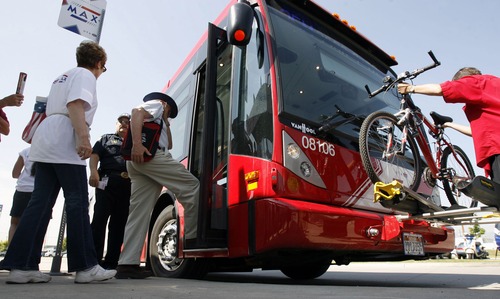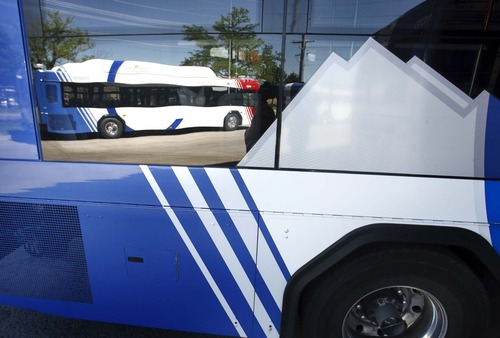This is an archived article that was published on sltrib.com in 2013, and information in the article may be outdated. It is provided only for personal research purposes and may not be reprinted.
Rep. Joel Briscoe, D-Salt Lake City, wants lawmakers to do something risky during the upcoming election year: debate whether to allow local governments to raise sales tax for mass transit by about 67 percent.
"We can't solve air pollution and [smoggy] inversions without it," he says.
He hopes to help pay to restore Utah Transit Authority bus service — cut amid the recession and high-cost construction of new rail projects — to encourage more people to leave cars at home. Expanding bus service is a cheap and effective way, he says, to help "the average person who wants to get out of the car a few days, or for several days during an inversion."
Briscoe is drafting legislation to raise the combined caps on sales taxes for transit to about 1 cent per dollar purchase. Areas served by the UTA now charge an average 0.6 cent per dollar, ranging from 0.69 percent in Salt Lake County to 0.53 percent in Utah County.
UTA officials told the Legislature earlier this year they would need a tax hike of that amount to fund transit improvements included in a statewide transportation plan for the next 30 years. The UTA Board also recently adopted as a top goal achieving full funding for that plan.
But UTA spokesman Remi Barron said, "UTA has not sought out any legislation seeking an increase in the sales-tax cap. Rather, UTA sees its role ... as one of listening to the community through its elected representatives and providing them with information. For this reason, we support Utah's Unified Transportation Plan which looks well into the future for both transit needs and revenue sources."
Briscoe says he is not seeking the bill at the behest of UTA. He explains that discussion of other tax hikes for transportation is possible in the upcoming legislative session, "and we need to talk about transit" because of its importance to reduce air pollution.
Among other transportation tax hikes being pushed, counties are seeking legislative permission to hike local gasoline taxes by 3 cents per dollar to provide more money for local roads. Rep. Jim Nielson, R-Bountiful, is proposing a bill to raise gasoline taxes by 1.5 cents a year for five years — 7.5 cents total — for state highway needs.
However, Rep. Johnny Anderson, R-Taylorsville, House chairman of the Transportation Interim Committee, has said legislative leaders want the committee to take another year to figure out how to fund state transportation needs — and focus now on identifying what those needs are.
Next year is an election year for all House members and half the Senate and lawmakers often avoid discussion of tax hikes close to elections. But Briscoe says it sometimes takes years to build support for tax increases, and "it takes some perseverance to pay off."
UTA officials told the Legislature earlier this year that to afford recent expansions to its TRAX and FrontRunner rail systems to expand future capacity, it had to cut bus services — especially at night and on weekends. It said sales-tax increases could help restore those, as well as fund new rail or "bus rapid transit" projects in the future.
Briscoe said he is not interested in funding fancy rail projects. He believes busescould more economically expand services to more areas and increase frequency.
"Sometimes [bus] transit is the cousin in the closet you don't want to talk about. We love to talk about our roads," he said. "We love talking about our fixed rail system, but buses aren't very sexy. But they can be put in place for much less money. They can be very effective. I'd like to bring back some of those bus services we cut and add more."
He says the main reason for him is to cut air pollution.
"I'm happy the that governor and a lot of other people are talking about how to clean the air. I want transit to have a seat at the table," he said.
Briscoe last year unsuccessfully sought funding to allow experimental free fares on transit during the two worst air pollution months of the year: January and July. He said he also hopes transit agencies might use part of a tax hike to help reduce fares or implement other programs to increase ridership in bad-air months.





